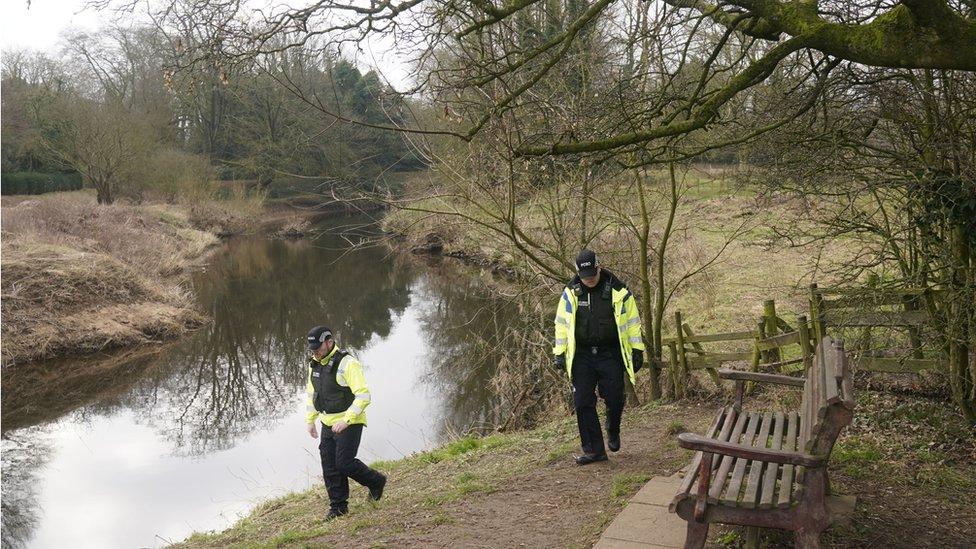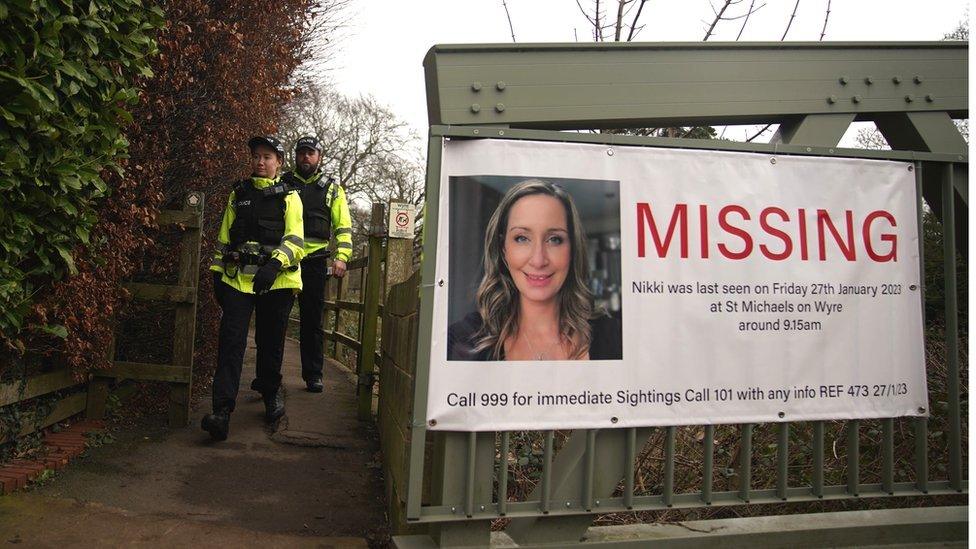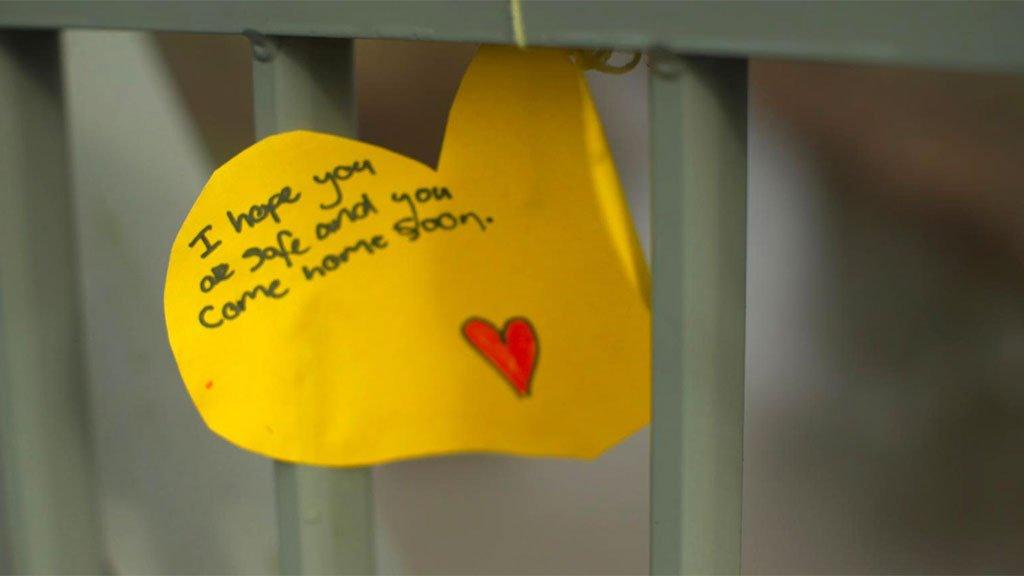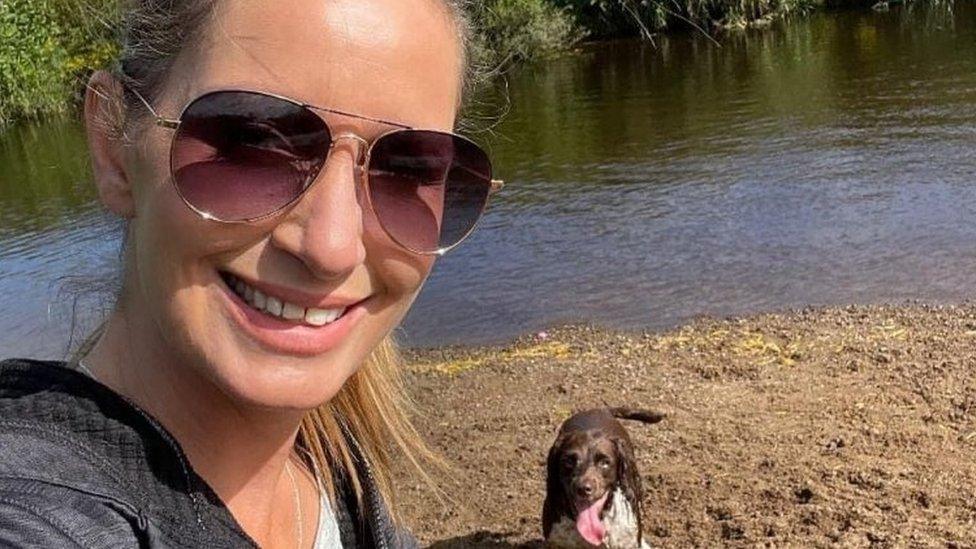Why TikTok sleuths descended on Nicola Bulley’s village
- Published

I am walking the same route that Nicola Bulley, 45, followed before she disappeared, along the river in the small Lancashire village of Saint Michael's on Wyre. It's also the same route that amateur social media sleuths take when they come to look into the case themselves.
They have been turning up in their numbers, prompted by rumours, speculation and conspiracy on social media viewed and shared by millions of people who have never been anywhere near this village.
The previous day, my TikTok feed had been recommended a clip of one of Nicola's friends appealing for her safe return. But the words "crisis actor" - a term used to describe someone who has been paid to act out a tragedy or scenario - had been added by someone else in large font.
My TikTok "For You Page" had been awash with videos speculating about Nicola's disappearance, recommended by TikTok's algorithm because I've shown an interest in them. But in recent days, these have escalated, and had widened out to include conspiracy theories suggesting the disappearance has been staged by the government or other sinister forces. Hence the video about friends "acting" I had been recommended.
I have previously covered how conspiracy theorists and trolls target survivors of terror attacks - like the Manchester Arena bombing in 2017 - with some going far as to track them down offline to find out if they were lying about their injuries.
This case is very different, but there has been drastic spiralling of speculation and conspiracy theories, which has triggered statements from Nicola's family, and police who issued a dispersal order.
This story has been a huge focus for the media, splashed on front pages daily. But I want to understand the scale of the social media frenzy.

Videos on Tik Tok have prompted people to come down to the river bank themselves
Metres from the bench where Nicola's phone was found, I bump into Jack and Stevie. The 20-year-old builders from Darlington have been putting up fencing in the area. But, having finished early for the day, they tell me the social media frenzy has led them down to the river bank.
"It's all through TikTok," Jack tells me. "[I saw] one video about it and thought I want to look deeper and deeper into it. So you get caught in that loop of looking and looking, and it interests you more and more as you go on."
Stevie agrees. He wants to know about "different scenarios and what people think". In his view interest in the case is still picking up steam on social media, rather than waning.
They head off, phones at the ready, to poke around the outside of a derelict out-house along the river bank. Neither post their own videos, and they don't agree with the more extreme conspiracies. Nonetheless, they say they find the social media posts compelling.
In the hours I spend near the bench, I meet others who have come here for the same reason. There's a dad and son who are visiting the scene during the school holidays - filming while they explore. Another pair arrive with two husky dogs, and tell me they've bought them to search the fields near the river.
Tourists travelling to scenes of disappearances are nothing new - nor are true crime sleuths online. But the frenzy on social media - and TikTok in particular - seems to be sucking in a huge number of people.

Local families have left flowers and notes expressing their hope that Nicola returns soon
As of Friday 17 February, when I checked TikTok, videos discussing Nicola Bulley's case since she first disappeared and using her name as a hashtag have accumulated more than 270 million views. In comparison, posts and videos using these same phrases on other major social media sites have had less traction.
Over the same period, I discovered that Instagram "reels" using Nicola Bulley's name have had more than 158 million views, and posts have had around 115,000 interactions - likes, follows and comments. On YouTube, videos I found using the same term have racked up 3.3 million views in total, while on Twitter my analysis of mentions and their potential reach estimates just under 21 million views.
On Facebook, where it's not possible to assess views easily, I found around 8,500 publicly-available posts on the term with over two million interactions on posts. Facebook groups dedicated to Nicola Bulley have more than 81,000 members, many sharing speculation about the case.
At a news conference this week, Lancashire police singled out "TikTok-ers" whom they said had "been playing their own private detectives". They said social media speculation has been a hindrance to their investigation, with Det Supt Becky Smith saying she had "never seen anything like it" in 29 years of working for the police.
TikTok videos I found suggesting Nicola Bulley's friends and family could be "crisis actors" staging events, questioning whether Nicola is real and alleging the case has been created as a "distraction" by the government have accumulated more than 1.5 million views.
These same conspiracies haven't accumulated as much attention on the other major social media sites. On Twitter, I found eight publicly available tweets that mention "crisis actors" and government distractions, with more than 65,500 views according to the site's own data.
On Facebook, I found two public posts pushing them with only about 150 interactions - and on Instagram and YouTube, I found no relevant posts when I searched using the same terms.
Caroline, who lives in a town nearby, says she has seen hundreds of TikTok videos pushing these false suggestions, some which have been recommended to her.
"Some of the things they point out in the videos make you think maybe they are onto something," she says.
"Then I give myself a wake-up and think why would they actually be doing that? What would they be acting for? What are we being distracted from?"
She was first recommended TikTok videos three days after Nicola disappeared. Since then, she's been hooked - and her own output, once dedicated to dancing with her kids, is now punctuated with clips of her speculating about Nicola. She wants to take part.
In one, Caroline calls out a false rumour about arrests in the case. But in another, she shares a clip that shows a TikTok influencer called Dan Duffy live-streaming on the app as he tries to enter a house on the other side of the river to where Bulley was last spotted.
"Being a mum myself I think it's nice to see people sharing hoping it might just trigger someone to come forward," she tells me.
"I also think that people trying to help search for anything that may locate Nicola's whereabouts is great also."
The house in Duffy's video has been at the centre of many rumours on social media, so much so that police stated that they had searched it three times.
Comments on Duffy's live stream encouraged him to carry on, and even call out Nicola's name.
Duffy was later arrested and fined by the police for a public order offence. TikTok also removed his account.
A statement from TikTok said that its "thoughts are with Ms Bulley's family and friends at this difficult time" .
It says it "does not tolerate bullying or harassment on TikTok and we remove content that violates our policies". It also revealed it is "deploying additional resources to reduce the potential spread of conspiratorial content about unfolding events by making it ineligible for recommendation to the For You feed".

Nicola Bulley disappeared while out walking her dog
A local dog walker, who doesn't want to be named over fears of backlash online, says he was outraged when he watched Duffy's livestream. He says he's seen people coming to the site, driven by social media.
He describes crowds of people and TikTokers filming the scene of the disappearance, including bringing children along and trying to climb fences.
"It's really difficult to hear [these conspiracy theories]. It's down to the police to investigate, not TikTokers," he says.
Frustrated locals have resorted to hiring local security to try to keep people away from their property.
This isn't just about social media. An absence of information, news that leaves us frightened or shocked and distrust are essential ingredients for rumour and conspiracy to thrive. Police have been criticised in recent days for their handling of the case.
There's also a huge amount of media interest, too. Rumours circulating online find their way into newspapers and new sites.
Then there's the legacy left by the boom of pandemic disinformation.
Research for the BBC by King's College London suggests that the pandemic has created a "gateway" for conspiracy theories denying that tragic events have happened, and calling people "crisis actors".
A significant number of people hyper-engaged on social media - with its powerful algorithms - and well-versed in this conspiracy lexicon are being presented with a disappearance at a time when trust in institutions, and the police, is low - providing a perfect storm.